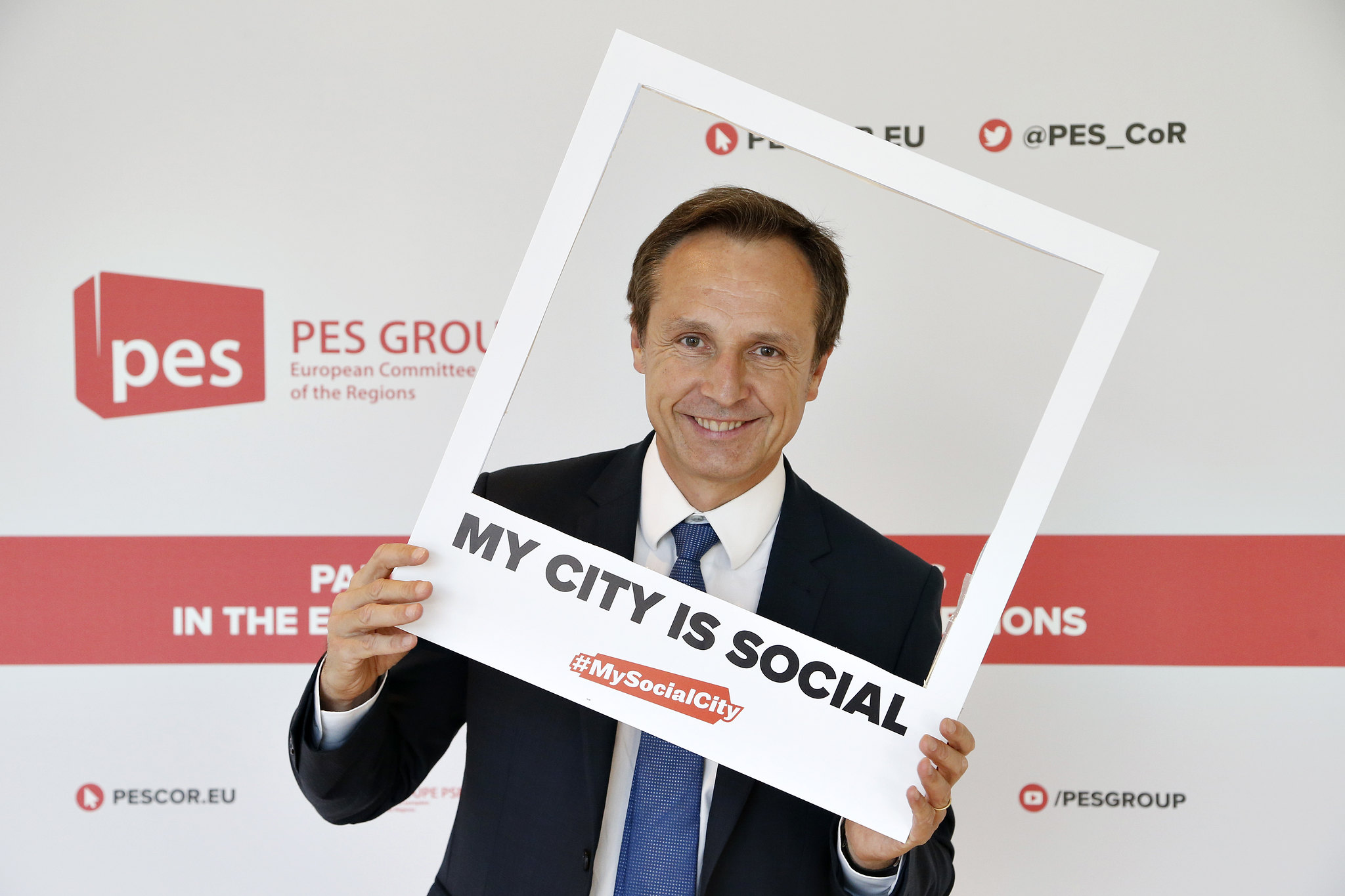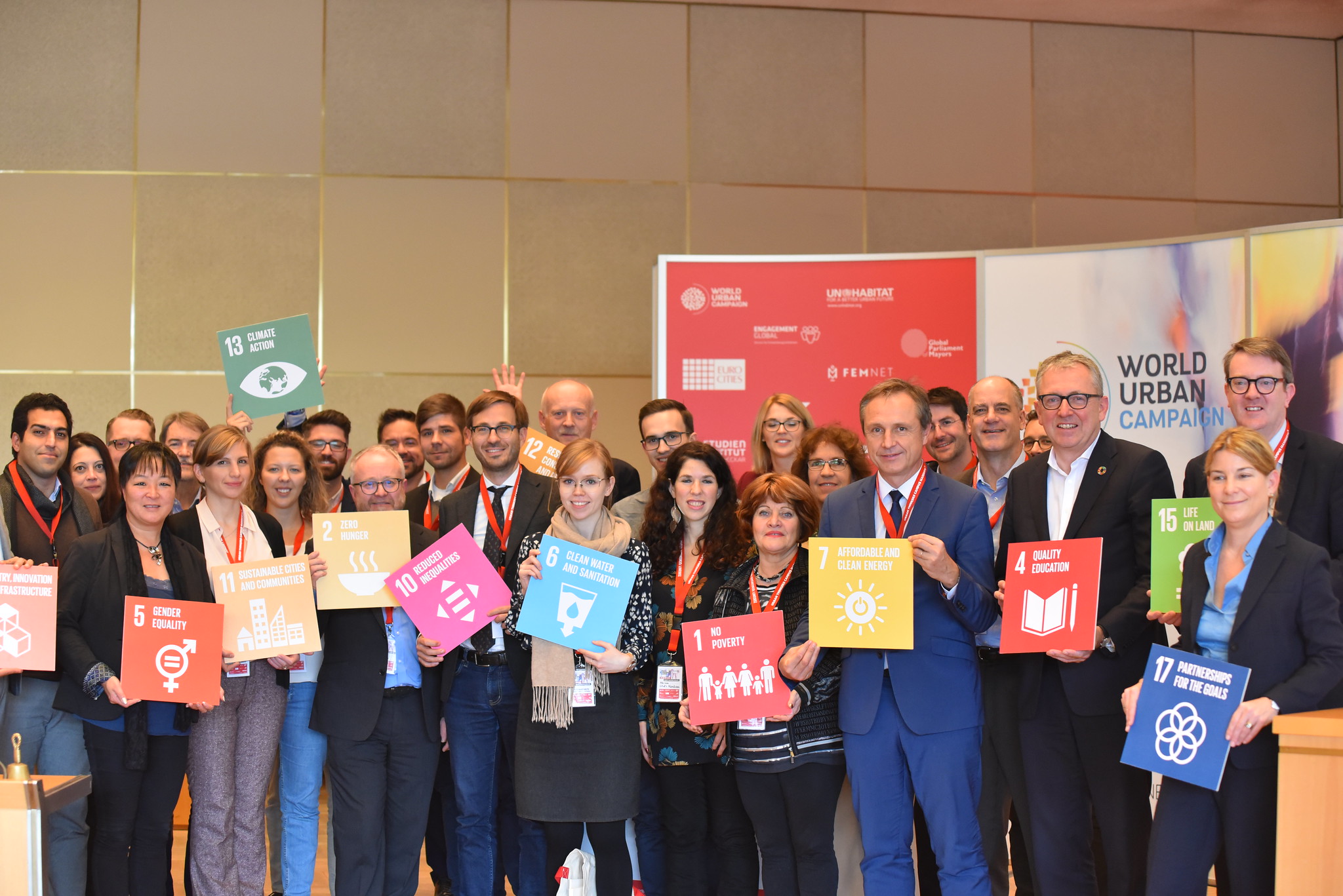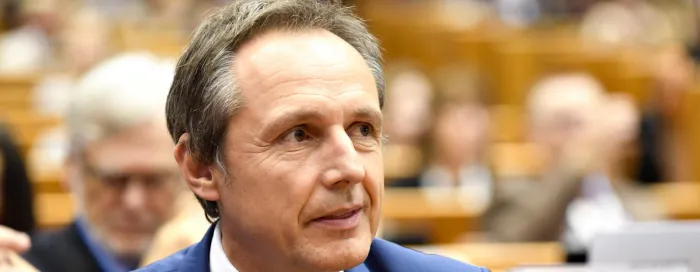You have just been confirmed as the president of the PES Group in the European Committee of the Regions. You are also the mayor of Coulaines, a town of some 8,000 inhabitants in the northwest of France. How do you see your two roles (and thus also the local and the European levels) combine? What are the key political priorities you want to bring forward during your mandate as PES Group president?
I have always faced up to my responsibilities. I have assumed my European commitment at all times because I consider that Europe is an opportunity for my fellow citizens and a great co-financing opportunity for my municipal projects.
We do not say it enough but Europe is present on every street corner of our 120,000 municipalities and regions in Europe. For example, in my town of Coulaines, Europe has awarded (thanks to the European Regional Development Fund) almost one million euros in subsidies for the energy renovation of the municipal swimming pool, which now rejects half as much CO2 in the atmosphere. In addition to this, every day dozens of families have enough to eat thanks to the food program for the poorest.
Based on my experience over the last 20 years as mayor of a suburban city with a threshold of 50% social housing and more than sixty different nationalities, I have tried on the one hand to give a concrete vision of the application in the field of European policies (in particular in the fields of the integration of refugees, of the fight against global warming, of the mobility of young students and apprentices as well as of research and innovation) and, on the other, to explain in an instructive way my commitment to the European Committee of the Regions as vice-president of the Association of Mayors of France in charge of Europe.
Our motto is “Think global, act local”. On this basis, our Group has just formulated some solid proposals in a document setting out its political priorities for the 2020-2025 mandate of the European Committee of the Regions, in particular in the fields of energy transition, sustainable growth and social housing, the future of cohesion funds and the ESF, research and innovation, the reform of the Economic and Monetary Union, workers protection, the regulation of globalization, marine energies, the reform of the CAP, the promotion of our heritage or of the European citizenship.
In the framework of the Conference on the Future of Europe, we intend to give our vision of the European Union with clarity and strength. We are not “euro-smug devotees”; we are “euro-actives” who are aware of the vital importance of repelling the assaults of the nationalists. We are also aware of the social and democratic conscious faults of the European Union that we urgently need to tackle in order to regain the confidence of the European citizens.
We will also defend the idea of a more political role for the European Committee of the Regions, which must be more than ever the voice of the territories within the EU institutions and the support of a greater European integration respectful of the principles of subsidiarity, solidarity and efficiency.
There are 120.000 regional and local authorities across the European Union. Many of them are led by progressive mayors and presidents like you. What do you think distinguishes progressive cities and regions from the rest?
I am convinced that the strength of the socialist family in its territorial network is underestimated and under-exploited. Bear in mind that, for the some120,000 regional and local and authorities, there are roughly one million politicians and, among them, at least a good third belong to the social democratic and progressive family in the broad sense of the word! A number of very important cities and regions are led by socialists and progressives: think of capital cities like Berlin, Brussels, Budapest, Paris, Vienna, Lisbon, Copenhagen. Think of the numerous regions in Germany, in Spain, in France, in Italy, in Austria or abroad like the Azores, and do not forget the small municipalities, peri-urban or rural, like mine!

This territorial network is essential for two reasons: firstly, because it is at local and regional level that the trust remains by far the highest. According to the latest Eurobarometer survey on the subject, the trust rate is of 53% for local and regional elected representatives, 43% for the European Union and 34% for national governments! Trust in the policies led by the socialist family is therefore largely built up by its action at local level. The second European lever for local and regional authorities for our political family is the role played by them in terms of concrete field policies. According to the figures of the Organisation for Economic Co-operation and Development (OECD), local authorities account for more than 50% of public investment - but only 33% of public expenditure and 15% of public deficits! Public investments, public services and good financial management: this is the socialist recipe at local level and it is an essential political and economic lever both at national and at European level.
So what distinguishes progressive cities and regions from others? First, I think it is the basic principle of social democracy to take social dialogue as the starting point for all political action. Social dialogue is about seeking interactions with unions in particular, but it must also take into account association work and, here, we are talking about participatory approaches.
Secondly, I believe that the action of progressive cities and regions is perceived as the most credible to meet the challenges coming from deep ecological and digital transitions. It is also the best placed to cope with the effects of globalization via climate change, the transformation of traditional forms of working conditions and the persistent, even growing inequalities as well as increasing isolationist tendencies.
What is the PES Group doing to bring them together?
At the European Committee of the Regions, the PES Group brings together nearly 200 elected representatives from the European socialist family but also from progressive left parties. They represent all the Member States of the European Union. They are the ambassadors of the “European socialist territorial cause” regarding their respective national parties, but also their governments and in interaction with other components of the European socialist family such as the Socialist and Democrats Group in the European Parliament or the Party of European Socialists. These elected representatives are the European socialists’ face on the ground. They invest in the exchange of best practices and obtain good expertise to implement European financial policies and programs. Moreover, these local and regional politicians are vectors and multipliers who, by snowball effect and decentralized experiences like our Progressive Local Labs on the implementation of the Sustainable Development Goals or the organization of Schools for young progressive elected representatives, spread European debates across Europe.

2020 begins with a heavy agenda, both for you with local elections coming up in March in France, and for the European Union with the European Green Deal, the battle on the next European budget and the opening of the Conference on the Future of Europe. On all these topics, local and European politics as well as policies are very much interlinked. How do you think the European Union can (and should) help cities and regions tackle the climate crisis as well as growing inequalities and reconnect at the same time citizens with the European project?
Firstly, I am pleased that in the context of the French municipal elections of March 2020, there is a growing awareness (carried in particular by associations like “Sauvons l'Europe” or the “Young European Movement”) that these elections are also about Europe and that there are many possible European commitments to be made at municipal level. Europe must better “percolate” and “decentralize” but it is an exercise that cannot be imposed by “Brussels” and even less by the capitals. This is also the challenge for the Conference on the Future of Europe. This cannot be an exercise with answers already given or precooked and that would only focus on institutional questions with little connection with the daily life of citizens.
The “Green Deal” seems to me to be already a very important concern in everyday life. Above all, the issue seems to me that the ecological transition is not an elitist exercise, reserved only for beautiful neighbourhoods and for those who can afford an electric car. It is necessary that the middle and less privileged classes as well as the territories weakened by the ecological and digital transitions benefit from it. To do this, there are two prerequisites. First of all, involve local authorities because, without their skills and resources, the transformation of the “Green Deal” will remain unfinished. Secondly, the Member States should give the European Union the means of their ambitions, namely fresh money and own resources. Above everything else: let's not rob Peter - namely the cohesion policy which is the policy that gives the most European impulses to the ecological and digital transition - to dress Paul - that is financial packages labelled sustainable but that might have a windfall effect for private investments.
"We need to get out of the institutions' buildings in Brussels. We are those in the territories and who are in touch with the citizens and their concerns.
— PES Group Committee of the Regions (@PES_CoR) February 3, 2020
With us there can be a renaissance of social-democracy in Europe."
—Our Group president @ch_rouillon pic.twitter.com/PPGq7lfDWg
**
Christophe Rouillon is mayor of Coulaines, Vice-President of the Association of French Mayors with responsibility for Europe and has been a member of the European Committee of the Regions since 2005. From July 2017 to June 2019, he was the 1st Vice-President of the Socialist Group in the European Committee of the Regions. From October 2019 he became the Group’s president. On 3 February 2020, he was confirmed as the Group's president for the 2020-2025 mandate of the institution.
